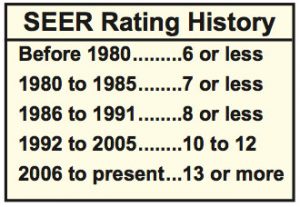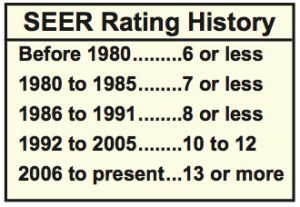[northwest_breadcrumbs]
Hannah Barney
So WHY should we care about high efficient AC?
Even though yesterday marked the official start of summer, most of us have already considered the past few weeks of heavy heat to be part of the season. I would bet that this last weekend was the final breaking point for any of us who really like to wait until the last minute to turn on our AC. Now that you have finally given in, maybe you’re noticing that your home doesn’t seem to be as cool as last summer. Or the summer before.
Most of us don’t care to think about our air conditioning… I mean as long as it’s working who cares? Though, what if you found out that you’re paying a high price just for that less effective cooling in your home? I’d bet you’d want to at least consider your options…
If your air conditioner is it’s nearing the end of its life (15 years or older), you’re probably looking to replace your unit. Maybe you’ve heard firsthand from a fellow friend or family member about when they replaced their air conditioner and it’s got you full of concerns. And rightfully so – this is a huge decision! So we’ve answered some of your most frequently asked questions to get you started…
High Efficiency Air Conditioning – Your FAQ:
“What does it mean when a unit has a high efficiency rating?”

The most common way to determine the efficiency of an AC unit is by looking at its SEER rating. SEER stands for seasonal energy efficiency ratio. The higher the SEER rating, the more efficient the unit is perceived to be.
“Does it REALLY cost more to operate an older AC unit?”
Yes, it does. According to the U.S. Department of Energy, “Today’s best air conditioners use 30% to 50% less energy to produce the same amount of cooling as air conditioners made in the mid-1970s. Even if your air conditioner is only 10 years old, you may save 20% to 40% of your cooling energy costs by replacing it with a newer, more efficient model”.
“What are the standards for high efficiency?”
“Nationwide, EPA standards require all air conditioners manufactured after Jan. 1, 2015, to have a minimum rating of 14 SEER. Previously, all systems manufactured after Jan. 23, 2006, had to achieve at least a 13 SEER rating.” (Angie’s List, What does SEER mean for your A/C?)
2016 has brought forward some new standards for the future of air conditioning efficiency. As reported by the National Resource Defense Council, “The agreement will require air conditioners and heat pumps to be at least 7 to 8 percent more efficient than the least efficient models available today, beginning in 2023. This represents a 50 percent energy efficiency improvement since national standards first took effect for air conditioners in 1992.”
“OKAY, but why should I choose a high efficient model?”

Lower utility bills – this is the top reason most people will choose a high efficient model. After all, who doesn’t want to cut costs? Especially considering your heating & cooling bills could make up almost half of your monthly utility costs!
Other benefits of a high efficiency AC unit:
- Improved Air Flow – cleaner air for your family. Will see the effects even quicker if you have pets or family members with allergies (they will be thankful!)
- Less Noise – your new unit will be considerably quieter thanks to system improvements.
- Decreased environmental impact – your new unit will help lower your household footprint.
- Home resale value – thinking of selling your home in the next couple years? Having an updated cooling system is a huge plus for those looking to buy.
Click Here for a list of the most efficient units of 2016 – provided by EnergyStar.
Didn’t get the answer to your question? Please feel free to reach out to us!
callnw1923@gmail.com
563-391-1344
